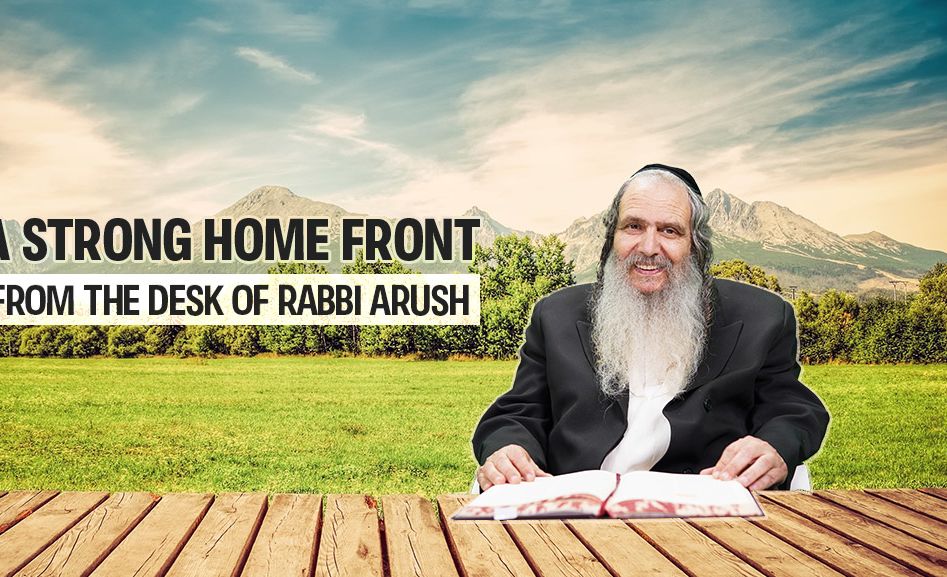
Criticism
Why did Rebbe Nachman place so much emphasis on avoiding criticism? Rebbe Nachman understood the importance of shalom bayit (peace in the home)...

The last time Rebbe Nachman of Breslev spoke publicly to his followers and disciples was on the very last Rosh Hashanah of his life, in the town of Uman in the central Ukraine during the year of 5571 (1811). Rebbe Nachman knew that his days were numbered and his lofty neshoma was already yearning for the days when it would no longer be confined to the limitations of the physical world. In fact, Rebbe Nachman discarded his bodily garment and returned his exquisite soul to Hashem a mere 17 days later, on the 18th day of Tishri, 5571.
Rebbe Nachman undoubtedly knew that this sermon would be his last. With several utterances, he hinted that he would soon be departing.
A pious man and a tzaddik speaks about the most important spiritual issues on his mind when his time on this earth is nearly expired. In a large sense, Rebbe Nachman’s Rosh Hashanah oration of 5571 was his last will and testament, his legacy to his Chassidim. For that reason, this oration – in essence an elaboration of Psalm 81 and recorded as Likutei Moharan II:8 – is affectionately and reverently known in Breslov as Ha’Tzevaa, or “The Will.”
In “The Will,” Rebbe Nachman teaches that although the Torah requires a person to reprimand a wrongdoer, few people are capable of doing so without causing damage to the reprimanded person’s soul. Accordingly, Rebbe Nachman cites a passage from the Gemorra in tractate Arachin where Rabbi Akiva says, “I’d be surprised if there is anyone in this generation who is capable of reprimanding another person!”
Rabbi Akiva’s generation was the generation of the holy Tannaim, the sages of the Mishna. The Talmud teaches that the most insignificant of these sages could revive dead people with their prayers and blessings. If they were angels, then we are mortals; if they were mortals, then we are mules. If such a holy generation wasn’t on the proper level required for reprimanding or criticizing another person, then we certainly are not.
Rebbe Nachman’s legacy to all of us is therefore, “Don’t criticize! Look for the positive rather than the negative in others!”
Why did Rebbe Nachman place so much emphasis on avoiding criticism? Rebbe Nachman understood the importance of shalom bayit (peace in the home) in the service of Hashem. Without shalom bayit, a person is incapable of functioning normally. Marital strife is the Yetzer Hara’s (evil inclination’s) most effective weapon in neutralizing Torah study and prayer, for a person that suffers from a stormy marriage is too preoccupied with his troubles to concentrate on his Torah studies or to pray with true fervor.
Rebbe Nachman, the master soul healer, knows that removing criticism from a marriage is like removing the firing pin from a firearm. He therefore implores us to refrain from any sort of criticism in our marriages, and to accept whatever comes our way happily and with emuna.
At this point, many people protest. They ask, “Isn’t it my job to tell my spouse what’s pleasing to me and what’s upsetting? Shouldn’t I help mold their character?”
Rav Shalom Arush shlit”a answers the above questions with a question of his own: “Have you finished molding your own character? Can you afford the luxury of molding someone else’s character?” We all know the answer – a double “no”.
Too many people are “crusaders of truth,” especially when it means exposing the faults of others. They wave the banner of hachoch tochiach, the mitzvah to reprimand a wrongdoer, their carte blanche to butcher their spouses for the slightest mishap. The Sefer Hachinuch in his elaboration on mitzvah 338 states that a man must be gentle and soft-spoken in his home and avoid causing fear and pain to his spouse. That rules out criticism, for nothing destroys a woman like criticism from her husband.
I often tell the “crusaders of truth” that there’s a mitzvah in the Torah that requires a person to write his wife a gett (writ of divorce) to terminate his marriage; that certainly doesn’t mean that we’re required to divorce our wives, Heaven forbid to fulfill that mitzvah. Rather, Hashem would have much more gratification if we write little love notes for our wives and attach them to a fresh-cut carnation. Mitzvot such as criticism and divorce are for extreme circumstances under specific conditions, and not for everyone on a daily basis.
Even worse, improper reprimanding and criticism, namely that which causes anguish to the other person, is a heinous double transgression of Torah (see Vayikra 19:17, 25:17). The damage far outweighs the benefits.
Should a person even try to mold his spouse’s behavior, even for the latter’s benefit? With Hashem’s help, we’ll find out next week.








Tell us what you think!
Thank you for your comment!
It will be published after approval by the Editor.